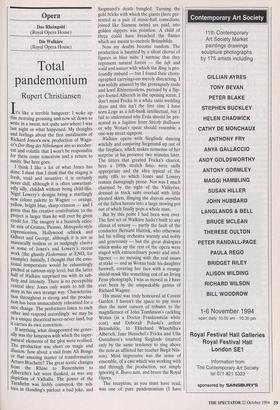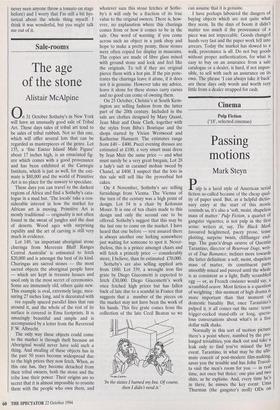Op e ra Die Walkiire (Royal Opera House)
Total pandemonium
Rupert Christiansen
IVs like a terrible hangover: I woke up this morning groaning and now sit down to write in a sweat, not quite sure where I was last night or what happened. My thoughts and feelings about the first instalments of Richard Jones's new production of Wagn- er's Der Ring des Nibelungen are so incoher- ent and volatile that I won't be responsible for them come tomorrow and a return to sanity. But here goes. I think I like a lot of what Jones has done. I think that I think that the staging is fresh, vivid and inventive: it is certainly never dull, although it is often unwarrant- edly silly, childish without being child-like. Nigel Lowery's designs bring a startlingly new colour palette to Wagner — orange, yellow, bright blue, sharp crimson — and I guess that his creative contribution to the Project is larger than he will ever be given credit for. The imagery is a bizarrely eclec- tic mix of Grimm, Picasso, Metropolis-style expressionism, Hollywood schlock and Gilbert and George, although it is not as maniacally restless or as nudgingly elusive as some of Jones's and Lowery's recent work (the ghastly Fiedermaus at ENO, for example). Initially, I thought that the emo- tional temperature would be exhaustingly pitched at cartoon-strip level, but the latter half of Walkiire surprised me with its sub- tlety and intensity. There is no perceptible central idea: Jones only wants to tell the story in his own strange way. Characterisa- tion throughout is strong and the produc- tion has been immaculately rehearsed for a nice change. The performers listen to each other and respond accordingly: we may be I11 a unique theatrical never-never land, but it carries its own conviction.
If anything, what disappointed me gener- ally was the lameness with which the super- natural elements of the plot were realised. The production was short on magic and illusion: how about a visit from Ali Bongo or that amazing master of transformation Arturo Brachetti? The great scenic changes from the Rhine to Reisenheim to Alberichs's lair were flunked, as was any depiction of Valhalla. The power of the Tarnhelm was feebly conveyed, the ash- tree in Hunding's parlour a bad joke, and Siegmund's death bungled. Turning the gold bricks with which the giants (here pre- sented as a pair of music-hall comedians, joined like Siamese twins) are paid, into golden slippers was pointless. A child of three could have breached the flames which are meant to encircle Briinnhilde.
Now my doubts become random. The production is haunted by a silent chorus of figures in blue suits: I surmise that they represent natural forces — the luft and wald and wasser with which the Ring is pro- foundly imbued — but I found their chore- ographed carryings-on merely distracting. I was mildly amused by the grotesquely nude and lewd Rhinemaidens, pursued by a flip- per-footed Alberich in the opening scene, I don't mind Fricka in a white satin wedding dress and this isn't the first time I have seen Loge as a left-bank intellectual, but I fail to understand why Erda should be pre- sented as a fugitive from Strictly Ballroom or why Wotan's spear should resemble a one-way street signpost.
Walkiire opens with Sieglinde dancing witchily and conjuring Siegmund up out of the fireplace, which makes nonsense of her surprise at his presence two minutes later. The titters that greeted Fricka's chariot, here a 1950s stretch limo, were sadly appropriate and the idea typical of the nutty riffs to which Jones and Lowery remain damagingly prone. Nor was I much charmed by the sight of the Valkyries, dressed in track suits overlaid with little pleated skirts, flinging the disjecta membra of the fallen heroes into a large stewing pot out of which finally pops a whole man.
But by this point I had been won over. The first act of Walkiire hadn't built to any climax of ecstasy — partly the fault of the conductor Bernard Haitink, who otherwise led his willing orchestra warmly and nobly and generously — but the great dialogues which make up the rest of the opera were staged with extraordinary power and intel- ligence — no messing with the real issues at stake — and as Wotan bade his daughter farewell, covering her face with a strange shield-mask like something out of an Irving Penn photograph, I was as moved as I have ever been by the unspeakable genius of Richard Wagner.
His music was truly honoured at Covent Garden. I haven't the space to pay more than the most cursory of tributes to the magnificence of John Tomlinson's cackling Wotan (in a Doctor Frankenstein white coat) and Deborah Polaski's ardent Briinnhilde, to Ekkehard Wlaschiha's Alberich, Jane Henschel's Fricka and Ulla Gustafsson's touching Sieglinde (marred only by the same tendency to sing above the note as afflicted her teacher Birgit Nils- son). Most impressive was the sense of ensemble, of a cast which was working with and through the production, not simply ignoring it. Bravo tutti, and bravo the Royal Opera.
The reception, as you must have read, was one of pure pandemonium (I have never seen anyone throw a tomato on stage before) and I worry that I'm still a bit hys- terical about the whole thing myself. I think it was wonderful, but you might talk me out of it.











































































 Previous page
Previous page